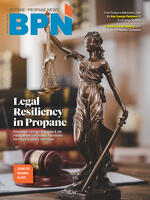
Every propane marketer has a responsibility to inform their customers about proper propane use and storage, pertinent safety information and possible hazards related to propane. Are you implementing the right steps to ensure your customers and company are protected from preventable propane accidents? Propane duty to warn mailings are an annual risk mitigation process for propane dealers to inform customers of this valuable information. Educating your customers about the proper use and storage of propane, as well as how to detect the warning signs of a gas leak, can significantly reduce the risk of propane-related hazards on customers’ properties. Equally important, it can reduce the risk of liability for your company.
By proactively informing customers, propane marketers who implement duty to warn safety mailings — an industry best practice endorsed by legal counsel and insurance companies — provides protection for customers and employees and legal protection for the company should a residential or commercial propane accident occur. Annual safety mailings must include several essential items that are both impactful and informative, ensuring customers get the message and remember it. This is also where third-party providers can be a vital resource for propane marketers to uphold quality, compliance and consistency with their annual duty to warn safety mailing.
What Are the Components of an Impactful Duty to Warn Mailing?
1. PERC’s Scratch-&-Sniff Brochure
The Propane Education & Research Council (PERC) literature included in a safety mailing should consist of a scratch-and-sniff brochure (mercaptan odor) titled “Important Propane Safety Information.” This brochure is designed to educate consumers to identify the smell of propane, respond to gas leaks, avoid carbon monoxide poisoning, use qualified professionals to install and service propane appliances, and more. Customers who read and apply this information will significantly reduce the possibility of a propane accident.
2. Informative Letter About Propane Safety
A letter branded with your company logo, name and contact information serves as an introductory overview message for customers to understand the risks related to propane, as well as proper use and storage. It also introduces the accompanying PERC brochure.
3. Jurisdictional Pipeline Color Marking Chart (Jurisdictional Accounts Only)
If your company has jurisdictional propane accounts, you must inform them of the national 811 service for safe digging near propane pipelines. In a letter or in brochure form, this information must be communicated twice per calendar year, per Title 49 of the Code of Federal Regulations Parts 191 and 192. More information is available at call811.com.
4. Verified Documentation for Your Duty to Warn Mailing
An official, independent, third-party certificate serves as documented proof that your duty to warn mailing was completed and sent, ensuring full compliance with industry standards — an essential safeguard for your records and insurance requirements.
Why It’s Helpful to Consider Third-Party Mailings
The true cost of managing your duty to warn mailing internally can be much higher than propane providers anticipate, especially when it comes to paying for postage, printing, brochures and lost hours your team could have spent completing work in the field. Consider sourcing this process to an outside vendor. A third-party vendor can provide propane marketers with a comprehensive and cost-effective program that includes branded, customized safety letters and the PERC brochure. Plus, they can mail this package directly to your customers and provide verification.
Common Objections to Using a Third-Party Mailing Service
The most common objections propane marketers pose to working with a third-party service on their duty to warn mailing typically consist of the following:
- “We do it internally with staff when they have free time or on weekends.”
- “We provide this information in welcome packets for new customers.”
- “It’s on our safety inspection forms.”
- “We include it on our bills and invoices.”
- “This information is on our website.”
While using these methods to take care of your duty to warn mailing in-house may seem sufficient, they can leave your company with substantial gaps in compliance and documentation. At the end of the day, internal efforts are often inconsistent, time-consuming, lacking in detail and do not provide the documentation you require to protect your company in the event of litigation or for insurance purposes.
Including information in packets, on invoices or online does not guarantee all customers will receive it. Sending your annual duty to warn as a standalone mailing with a third-party provider ensures complete, documented compliance, while saving time, reducing risk and protecting your business.
Benefits of Using a Third-Party Provider
You can never overcommunicate safety to your customers. A third-party provider handling your annual Duty to Warn safety mailing can protect your customers and company based on feedback gathered from legal and insurance providers. With a third-party provider, you can rest assured that your customers receive high-quality materials:
- Professionally printed materials: Safety mailings produced by a third-party vendor include professionally printed materials. When presenting your introductory safety letter to your customer, do it with a letter designed and branded for your company and the latest PERC scratch-and-sniff brochure.
- Printing and postage discounts: Because of the volume at which they work, third-party safety mailing vendors have access to better pricing for printing and postage. This high-volume pricing ensures your company will receive affordable rates for expedited production and mailing.
- Reduced risk of returned mail: Third-party vendors use several mailing software platforms to ensure your customer list is as accurate as possible, which significantly reduces the likelihood of returned mail. Additionally, a reputable vendor will keep your customer list secure and confidential.
- Third-party verification: Receiving a third-party verification certificate is crucial to protecting your propane company. They will provide you with documentation, stamped with the date and time that your safety mailing was sent to your customer list.
- Approval from legal counsel and insurance providers: Third-party safety mailings are approved and recommended by both legal counsel and insurance providers. Third-party verification provides valuable documentation that your safety mailing was sent, and records such as those could be requested in the event of litigation or an insurance claim.
- Record retention: Top duty to warn providers will store and maintain records securely on hand for years in case you ever need evidence of your documentation for litigation purposes.
- Overall efficiency: Using a third-party vendor to send your annual safety mailing ensures that daily operations at your propane company remain cost-effective and efficient. Additionally, external production frees up facility and storage space at your location, and electronic storage of documentation allows for accurate recordkeeping and document retrieval.
The Future of Duty to Warn Safety Mailings
In recent years, there have been a high number of reported propane incidents; therefore, PERC is working on new and more effective ways to get the safety message to propane customers. A survey conducted by a PERC-appointed vendor determined that there is significant interest in a digital duty to warn offering, and eventually, the digital offering will supplement the standard mailing. Because a digital mailing cannot include a scratch-and-sniff test, the digital mailing will include an option to order a free test card with propane odorant on it.
Make the Smart Choice for Your Duty to Warn Mailing This Year
In 2024, over 5 million PERC brochures were purchased and mailed across the country by marketers. Was your company one that sent this valuable consumer safety information to its customers? Be recognized as a responsible, customer service- and safety-oriented propane marketer that puts customer and employee safety first.
The most effective way to send your duty to warn safety mailing is with a third-party service to reduce costs for your company, improve efficiency and allow your employees to make the most of their time at work. Partner with a third-party provider to make your annual safety mailing as efficient as possible this year.


